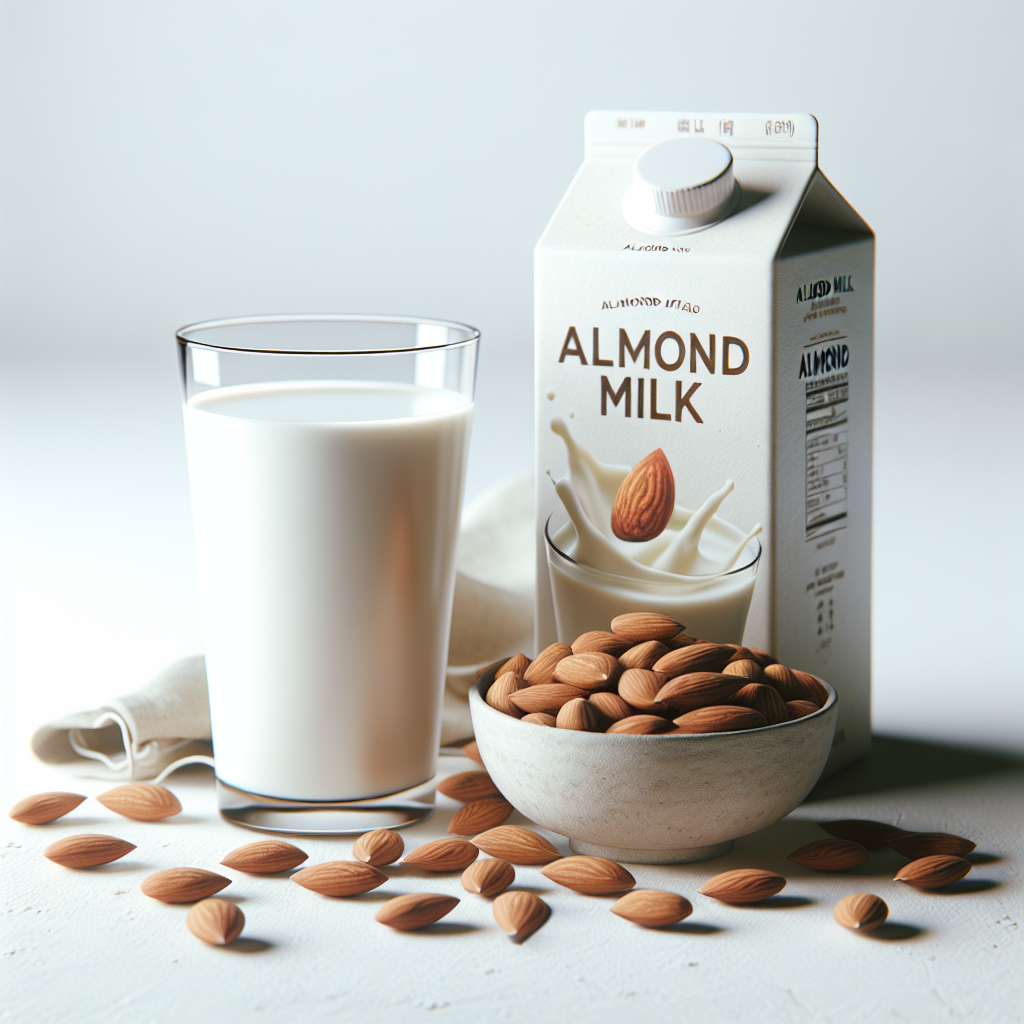Almond milk has surged in popularity over the past decade, becoming a staple in the kitchens of many health-conscious individuals. Derived from *nutritious almonds*, this dairy-free alternative boasts a wealth of benefits, making it an excellent choice for those seeking a healthier lifestyle without compromising on taste or nutrition.
One of the primary reasons people turn to almond milk is its **versatility and rich nutrient profile**. Packed with vitamins and minerals, almond milk is naturally lactose-free, making it an ideal option for lactose-intolerant individuals. Additionally, it contains no cholesterol or saturated fats, promoting better heart health.
Another compelling reason to choose almond milk is its eco-friendly nature. Unlike traditional dairy farming, which can have a significant environmental footprint, producing almond milk requires fewer resources, contributing to a more sustainable lifestyle. By opting for almond milk, you're not only making a healthy choice for yourself but also a conscientious one for the planet.
Curious about making your own fresh and delicious almond milk at home? With the revolutionary blender from MilkDepot.ca, you can easily create your own almond milk in less than 60 seconds. No additives, no preservatives—just pure, fresh almond milk. Get yours today!
Health Benefits of Almond Milk

Almond milk is not only a delicious dairy-free alternative but also a powerhouse of nutrition that offers a myriad of health benefits. One of the most notable advantages of almond milk is its **low-calorie content**. Unlike whole milk, which can be high in calories and fat, almond milk is naturally low in calories, making it an excellent choice for those watching their weight.
Furthermore, almond milk is rich in *vitamins and minerals*. It is an excellent source of vitamin E, a powerful antioxidant that helps combat oxidative stress and promotes skin health. Almond milk is also fortified with essential nutrients like calcium and vitamin D, which are crucial for maintaining strong bones and teeth.
For individuals managing their blood sugar levels, almond milk is a favorable option. It has a *low glycemic index*, meaning it won't cause a significant spike in blood sugar levels, making it suitable for people with diabetes or those aiming to stabilize their blood sugar.
Moreover, almond milk is naturally lactose-free, making it a safe and healthy option for those with lactose intolerance. It is also free from cholesterol and saturated fats, which supports cardiovascular health by keeping your heart in good shape.
In addition to these benefits, almond milk can also enhance digestive health. Many commercial almond milks are fortified with fiber, which aids in healthy digestion and prevents constipation. By incorporating almond milk into your diet, you're not only enjoying a tasty beverage but also reaping a host of health benefits.
Nutritional Value of Almond Milk

When it comes to the *nutritional value* of almond milk, this dairy-free alternative packs a punch with its impressive nutrient profile. One of the standout features of almond milk is its **low-calorie count**. A single cup of unsweetened almond milk can contain as few as 30-50 calories, making it a fantastic option for those who are calorie-conscious.
Almond milk is also a rich source of *vitamin E*, providing about 50% of your daily recommended intake in just one serving. Vitamin E is a potent antioxidant that plays a vital role in protecting your cells from damage, supporting immune function, and promoting skin health.
Additionally, many commercial almond milks are fortified with essential nutrients to enhance their nutritional value. These often include *calcium* and *vitamin D*, both of which are essential for maintaining healthy bones and teeth. A typical cup of fortified almond milk can provide around 20-30% of your daily calcium needs and 25% of your daily vitamin D requirements.
Almond milk is also low in carbohydrates, especially the unsweetened varieties. This makes it an ideal choice for those following a low-carb or ketogenic diet. Moreover, it contains no saturated fats or cholesterol, which can contribute to better heart health.
Another essential nutrient found in almond milk is *magnesium*, which plays a crucial role in muscle function, blood sugar control, and blood pressure regulation. Almond milk can provide a modest amount of protein as well, although not as much as cow's milk. However, it compensates with its rich array of vitamins and minerals.
Overall, almond milk offers a balanced blend of nutrients that can contribute to a healthy diet. Whether you are lactose intolerant, vegan, or simply looking for a nutritious beverage, almond milk is a versatile and healthful choice.
Eco-Friendly and Sustainable Choice
Choosing almond milk is not only beneficial for your health but also for the environment, making it an *eco-friendly and sustainable choice*. One significant advantage is that almond milk production has a relatively lower carbon footprint compared to traditional dairy milk. Dairy farming is known for its high greenhouse gas emissions, primarily methane, which contributes to climate change. In contrast, almond milk production generates fewer emissions.
Water usage is often cited as a concern in almond farming, but it's important to note that advancements in agricultural practices are helping to reduce water consumption. Drip irrigation and other water-saving technologies are increasingly being used to cultivate almonds more sustainably.
Moreover, almond milk is typically packaged in recyclable cartons, further reducing its environmental impact. Many brands are also moving towards using *plant-based and biodegradable packaging materials*, which helps minimize waste and pollution.
Another critical aspect of almond milk's sustainability is that it does not require the same amount of land as dairy farming. Dairy farming demands vast expanses of land for grazing and growing feed crops, leading to deforestation and habitat loss. Almond trees, on the other hand, can be grown on smaller plots of land and often contribute to better land use efficiency.
Additionally, almond milk production supports the cultivation of almond trees, which play a role in carbon sequestration. Trees absorb carbon dioxide from the atmosphere, helping to mitigate the effects of climate change. Almond orchards also contribute to biodiversity by providing habitats for various wildlife species.
Lastly, almond milk is free from antibiotics and hormones commonly used in dairy farming, reducing the chemical load on the environment. By choosing almond milk, you are not only making a healthier choice for yourself but also supporting more sustainable and environmentally friendly agricultural practices.
Cost Savings Compared to Store-Bought Milk

One of the most compelling reasons to switch to homemade almond milk is the *significant cost savings* compared to store-bought milk. While store-bought almond milk can be convenient, it often comes with a higher price tag due to packaging, transportation, and retail markups. By making your own almond milk at home, you can save up to *90%* of the cost.
Consider the simple ingredients required for homemade almond milk: just almonds and water. Purchasing almonds in bulk can be much more cost-effective than buying pre-packaged almond milk. Additionally, when you make almond milk at home, you can control the quality and quantity of ingredients, ensuring you get the most value for your money.
Another financial benefit is the ability to *reduce waste*. Store-bought almond milk often comes in cartons that need to be disposed of or recycled, adding to your household waste and potential recycling costs. Homemade almond milk can be stored in reusable glass jars or bottles, which are both eco-friendly and economical.
Beyond the direct financial savings, making your own almond milk allows you to create customized flavors and nutritional profiles without the added costs of flavored store-bought varieties. You can add natural sweeteners, vanilla, or other flavorings at a fraction of the cost.
Moreover, the shelf life of store-bought almond milk is limited, often resulting in wasted products if not consumed by the expiration date. Homemade almond milk can be made in smaller batches, reducing the likelihood of waste and ensuring you always have fresh milk on hand.
Lastly, investing in a high-quality blender like the one offered by MilkDepot.ca can be seen as a long-term financial investment. The initial cost of the blender is quickly offset by the continuous savings from making your own almond milk. Over time, the savings add up, making homemade almond milk a financially savvy choice for any household.
Easy Homemade Almond Milk Recipe

Making almond milk at home is not only cost-effective but also incredibly simple. With just a few ingredients and a powerful blender, you can enjoy fresh, delicious almond milk in minutes. Follow these easy steps to create your perfect homemade almond milk:
- Ingredients:
- 1 cup of raw almonds
- 4 cups of filtered water
- Optional: sweeteners like honey, maple syrup, or dates, and flavorings like vanilla extract or a pinch of salt
- Instructions:
- Soak the almonds: Place the raw almonds in a bowl and cover them with water. Let them soak for at least 8 hours or overnight. This softens the almonds and makes them easier to blend.
- Drain and rinse: After soaking, drain the almonds and rinse them thoroughly under cool running water.
- Blend: Add the soaked almonds and 4 cups of filtered water to your blender. Blend on high speed for about 60 seconds until the mixture is creamy and smooth. The MilkDepot.ca blender is perfect for this step, providing a powerful and efficient blending experience.
- Strain: Pour the blended mixture through a nut milk bag, cheesecloth, or a fine-mesh strainer into a bowl or pitcher. Squeeze or press to extract as much liquid as possible. The result is smooth, creamy almond milk.
- Sweeten and flavor (optional): If desired, add your choice of sweeteners and flavorings. Blend again briefly to combine.
- Store: Transfer the almond milk to a glass jar or bottle and refrigerate. Homemade almond milk typically lasts for 3-5 days in the refrigerator. Shake well before each use.
For those who love fresh, customizable almond milk, owning a high-quality blender is a game-changer. Get yours today! Experience the joy of making delicious, homemade almond milk quickly and effortlessly with MilkDepot.ca's revolutionary milk maker.
